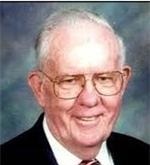Malcolm O. Tolbert had a long and varied career within Baptist religious circles, beginning as a pastor at the age of 18, missionary in Brazil, seminary professor and author of many books on the interpretation of Scripture.
In 1952, Tobert responded to a call to missionary service in Brazil, where he was widely praised for his singular command of the Portuguese language and the broad appeal of his sermons.
He left the mission field to continue his graduate studies at New Orleans Baptist Theological Seminary, where he received a Th.D. He became a faculty member at New Orleans Seminary and was one of the most popular professors, teaching basic courses in Greek, New Testament and theology. His courses always were hard to get into.

Malcolm Tolbert
I met Tolbert when he was on the faculty of Southeastern Baptist Theological Seminary in Wake Forest, N.C. I had him for a year of advanced Greek. Tolbert knew Koine Greek like the back of his hand.
Koine Greek is not only important because it is the language used by writers of the New Testament. It also was used to translate the Hebrew Bible in the third century BC. The Greek translation of the Hebrew Bible is called the Septuagint, and this was the version of the Hebrew Bible used by the New Testament church.
I actually preferred Hebrew to Greek. In Hebrew you read right to left and vowels are not in the text but have to be inserted. It’s a pretty cool language to study. I found Greek to be more mundane, even with the personable Professor Tolbert as my instructor.
Forty years after that advanced Greek class, what I remember most has nothing to do with Greek but how Tolbert ranted and raved about the “unnecessary that” used by authors writing in English. I have no idea how the “unnecessary that” related to a class in Greek, but Tolbert was obsessed with “unnecessary thats” and took class time to teach about the evil “unnecessary that.” Repeatedly, throughout the whole year, he brought up the topic of the “unnecessary that.”
When someone’s obsession is drilled into you, there’s a good chance their obsession becomes your obsession. That’s exactly what happened with me. For the life of me, I can’t read an article in the newspaper or read a book without being hypercritical about “unnecessary thats.”
I tell you what I’m going to do right now. I’m going to read an opinion piece by an excellent columnist in The York Times. I love the author’s opinions and writing, but I guarantee you I can find unnecessary thats. I can’t recall the last time I didn’t find an “unnecessary that” in an article.
I’m going to show you the first “unnecessary that” in the opinion piece and then I’m going to tally up all the “unnecessary thats” in the article. I’ll have a total for the author and a total for all the “unnecessary thats” in quotes used by the author.
Here we go, in memory of Malcolm Tolbert, on a hunting expedition for “unnecessary thats,” a “that” unnecessary to the writing of a sentence.
Here’s the first paragraph from an opinion piece in The New York Times. It has three “thats” in it, two used by the author and one in a quote. See if you can pick out the “unnecessary that.”
“When House Republicans return from their recess this fall, they’re likely to have an item on their agenda besides pushing the government toward shutdown: impeaching Joe Biden. ‘You’ve got to get to the bottom of the truth, and the only way Congress can do that is go to impeachment inquiry,’ the Republican House speaker, Kevin McCarthy, said on Tuesday. Some Republicans are pretending that a mere inquiry doesn’t imply an actual impeachment, but it’s hard to imagine MAGA congressmen being satisfied with an investigation that stops short of bringing charges.”
The first “that” in the last sentence is unnecessary. Here’s how it should read: “Some Republicans are pretending a mere inquiry doesn’t imply an actual impeachment, but it’s hard to imagine MAGA congressmen being satisfied with an investigation that stops short of bringing charges.”
The rest of the article had four “unnecessary thats” written by the author and four “unnecessary thats” in quotations.
Malcolm Tolbert would go ballistic. And this by a New York Times regular columnist.
I asked Tolbert to preach at a revival at a church I served as pastor when I was in seminary. He gladly agreed. I told him we would give him a set amount of money for his service. He grinned and said, “That’s good. Love offerings never work for me. I don’t have an awful testimony to share. I have not done drugs, been unfaithful to my wife, or committed all sort of sins, and then found the Lord. The Christians love that sort of thing, but I’ve got a pretty boring testimony, which doesn’t lend to good love offerings.”
Tolbert was such a good preacher at the revival my wife and two other members couldn’t help but laugh at many parts of his sermons. He was a great speaker who kept your attention.
Just for the heck of it I read Malcolm Tolbert’s obituary, curious if there were any “unnecessary thats.” What I found was one of the best written obituaries I’ve ever read. It did not have a single, evil “unnecessary that.”
You can rest in peace, Dr. Toblert.
Note: The editor of Baptist News Global concurs with Malcolm Tolbert’s disdain for the unnecessary and seeks at all times to eradicate such. We publish at least 50% fewer “thats” than The New York Times.
Chris Ayers recently retired as pastor of Wedgewood Church in Charlotte, N.C., after 30 years there. He earned master of divinity and master of theology degrees at Southeastern Theological Seminary and a doctor of ministry degree from Columbia Theological Seminary. He also completed an intensive two-year training program at Presbyterian Samaritan Counseling Center in Charlotte and reached member level of the American Association of Pastoral Counselors.


